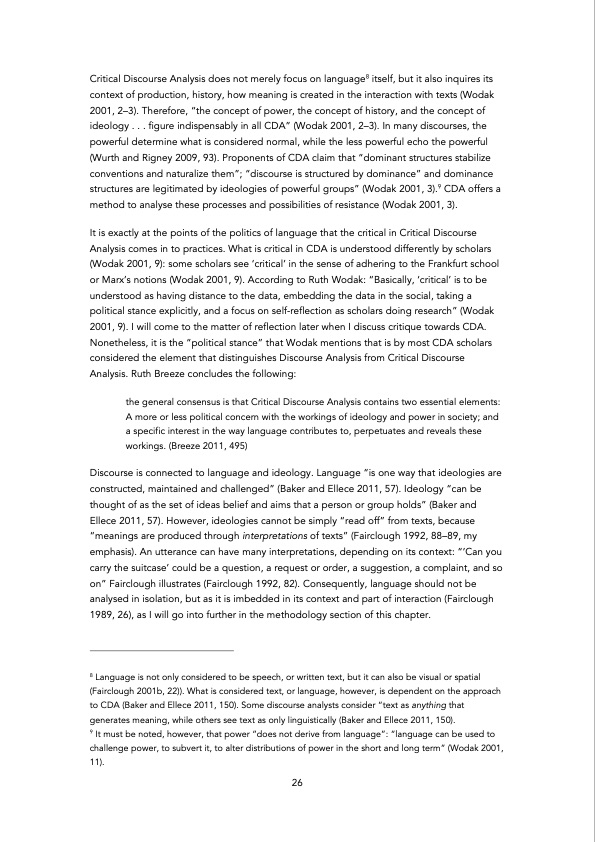
PDF Publication Title:
Text from PDF Page: 026
Critical Discourse Analysis does not merely focus on language8 itself, but it also inquires its context of production, history, how meaning is created in the interaction with texts (Wodak 2001, 2–3). Therefore, “the concept of power, the concept of history, and the concept of ideology . . . figure indispensably in all CDA” (Wodak 2001, 2–3). In many discourses, the powerful determine what is considered normal, while the less powerful echo the powerful (Wurth and Rigney 2009, 93). Proponents of CDA claim that “dominant structures stabilize conventions and naturalize them”; “discourse is structured by dominance” and dominance structures are legitimated by ideologies of powerful groups” (Wodak 2001, 3).9 CDA offers a method to analyse these processes and possibilities of resistance (Wodak 2001, 3). It is exactly at the points of the politics of language that the critical in Critical Discourse Analysis comes in to practices. What is critical in CDA is understood differently by scholars (Wodak 2001, 9): some scholars see ‘critical’ in the sense of adhering to the Frankfurt school or Marx’s notions (Wodak 2001, 9). According to Ruth Wodak: “Basically, ‘critical’ is to be understood as having distance to the data, embedding the data in the social, taking a political stance explicitly, and a focus on self-reflection as scholars doing research” (Wodak 2001, 9). I will come to the matter of reflection later when I discuss critique towards CDA. Nonetheless, it is the “political stance” that Wodak mentions that is by most CDA scholars considered the element that distinguishes Discourse Analysis from Critical Discourse Analysis. Ruth Breeze concludes the following: the general consensus is that Critical Discourse Analysis contains two essential elements: A more or less political concern with the workings of ideology and power in society; and a specific interest in the way language contributes to, perpetuates and reveals these workings. (Breeze 2011, 495) Discourse is connected to language and ideology. Language “is one way that ideologies are constructed, maintained and challenged” (Baker and Ellece 2011, 57). Ideology “can be thought of as the set of ideas belief and aims that a person or group holds” (Baker and Ellece 2011, 57). However, ideologies cannot be simply “read off” from texts, because “meanings are produced through interpretations of texts” (Fairclough 1992, 88–89, my emphasis). An utterance can have many interpretations, depending on its context: “’Can you carry the suitcase’ could be a question, a request or order, a suggestion, a complaint, and so on” Fairclough illustrates (Fairclough 1992, 82). Consequently, language should not be analysed in isolation, but as it is imbedded in its context and part of interaction (Fairclough 1989, 26), as I will go into further in the methodology section of this chapter. 8 Language is not only considered to be speech, or written text, but it can also be visual or spatial (Fairclough 2001b, 22)). What is considered text, or language, however, is dependent on the approach to CDA (Baker and Ellece 2011, 150). Some discourse analysts consider “text as anything that generates meaning, while others see text as only linguistically (Baker and Ellece 2011, 150). 9 It must be noted, however, that power “does not derive from language”: “language can be used to challenge power, to subvert it, to alter distributions of power in the short and long term” (Wodak 2001, 11). 26PDF Image | peek into the discursive construction of the Google Search Algorithm: A critical discourse analysis

PDF Search Title:
peek into the discursive construction of the Google Search Algorithm: A critical discourse analysisOriginal File Name Searched:
thesis-google-search-algotithm.pdfDIY PDF Search: Google It | Yahoo | Bing
Cruise Ship Reviews | Luxury Resort | Jet | Yacht | and Travel Tech More Info
Cruising Review Topics and Articles More Info
Software based on Filemaker for the travel industry More Info
The Burgenstock Resort: Reviews on CruisingReview website... More Info
Resort Reviews: World Class resorts... More Info
The Riffelalp Resort: Reviews on CruisingReview website... More Info
| CONTACT TEL: 608-238-6001 Email: greg@cruisingreview.com | RSS | AMP |